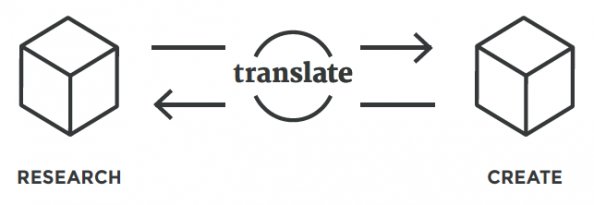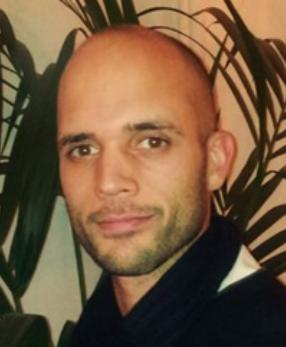A fast-paced, agile design programme with room for experimentation and personal development
MediaLAB Amsterdam uses a combination of an iterative design cycle and the Scrum process in order to foster both the creative process and enforce teams to work structured and goal oriented. This has proven to be a powerful combination for the multidisciplinary design teams that work on projects in the lab-context that we provide. The process is further fed by workshops, master classes, an extensive design (research) method toolkit, expert meetings, and supported by (embedded) researchers and MediaLAB coaches.
Design Process
The MediaLAB Amsterdam design process is a problem solving method that helps create and evaluate solutions in response to challenges. In the process MediaLAB intends to evoke real curiosity in order to make students feel highly motivated to find answers and solutions. This involves lots of iterations, making, prototyping, going out on field studies and test each idea, concept or prototype with actual users.
Research, translate, and create
At the start of every design challenge, and at the start of each new phase in the design process, research has a central role. Research provides plenty of insights; how people act/think/feel and who the intended users are, within the context of the challenge.

These insights are the key to a solution, but they have to be translated into actual design requirements: which are key for the optimal solution? This is something that can be decided based on the research, and implemented and tested by creating a prototype. A next step might be to research again into what you created by setting up a test with users.
During the project there is a constant two-way flow: from research, translation to creation, and from creation, translation to research.
Scrum
Scrum is an iterative and incremental process for the design and development of products and services, and it has a very specific way of organizing a team. Tasks are achieved faster and with higher quality when using the Scrum-Framework. This is possible because of the high self-motivation of the team, which chooses itself how tasks will be executed. The project assigner’s demands will be iteratively prioritized and quickly realized.
At MediaLAB Amsterdam, the flow of the design process is embedded in a sprint-based schedule, supported by Scrum roles, rituals, sessions and artifacts that support the process.
Sprints
A sprint (or iteration) is the basic unit of development. The sprint is a “timeboxed” effort; that is, it is restricted to a specific duration. The sprints in the MediaLAB programme have an average duration of three weeks.
Rituals
At the MediaLAB we use specific ‘rituals’ during each sprint. Each sprint starts with an ideation and planning session, has a mid-sprint translation session, and ends with a sprint review meeting and retrospective. During a sprint, the team has daily stand up meetings.
Daily standup meeting
The daily standup meeting takes place at the same time and place of every working day. Held (first thing) in the morning, it helps set the context for the coming day’s work. These standup meetings are strictly time-boxed to 15 minutes and all team members actually standup instead of sitting down. This keeps the discussion brisk but relevant.
The daily standup meeting is not used as a problem-solving or issue resolution meeting. Issues raised are taken offline and usually dealt with immediately after the meeting. During the daily standup, each team member answers the following three questions:
· What did you do yesterday?
· What will you do today?
· Are there any impediments in your way?
Ideation and planning session
Every sprint has an ‘ideation and planning’ session. In this session the creative process is triggered by the facilitation of a brainstorm and ideation session in which ideas are identified and quickly sketched.
The most promising ideas are placed in a hierarchy and it is decided which have potential to be taken along in this sprint. After this, tasks are identified, but more importantly the exact sprint goal (and duration) is defined.
Last but not least, in this session a plan board in combination with the Design Method Toolkit is used to identify which methods are going to be used and how they are going to be executed during the sprint.
Translate session
In the middle of the 3-week sprint, there is a scheduled ‘translate’ session in which your team and the project-related researchers come together to translate research insights and decide which things to act on in this sprint or the next. Each translation session and its outcomes are carefully documented. The documentation is very important for later use in the academic paper, but moreover, it provides the team with a clearer overview of why they made or have to make specific decisions in the design process.
Sprint review
After the team has completed the planned deliverables for this sprint it is time for the ‘sprint review’. In this meeting, which is organized with all stakeholders present, decisions on progress and how to proceed are made, including next steps and possible needs and wishes. Specifically, the team will present the work they did during the sprint and will run through the sprint backlog together with stakeholders.
Sprint retrospective
A ‘sprint retrospective’ is held at the very end of each sprint. This is a meeting to reflect on both the results and the processes with the team. It is meant to change, improve, or stick to the way they work and function as a team.
Design Method Toolkit
The MediaLAB Amsterdam Design Method Toolkit enables you to get started and enrich your design process. Plan and execute your design research, ideation, experimentation and creation within short iterations.
A collection of design and research methods: categorised to help you select, time based to help you plan. Detailed task descriptions help teams divide and assign tasks between team members. This makes the Design Method Toolkit perfect for lean, agile environments and multidisciplinary teams.
Plan board
On the back of each Scrum board, a Plan board can be found. This board is used to plan specific activities, either by using methods or without. These activities are translated into detailed tasks. These tasks can be either taken along in the new sprint or stored in the backlog for later use.
First the team decides whether a User Story requires a method. When a method is required, the team uses the Design Method Toolkit to select a method, and find out which tasks are required to execute it. When planning, the time estimation on the cards is also used as indicator.
Workshops
An important part of the support in the design process consists of the workshop programme. These workshops are facilitated by experts from the MediaLAB, Amsterdam University of Applied Sciences and the field. They follow the work intensity and current needs of the teams as the programme evolves. Specifically, the workshops relate to the Design Method Toolkit’s categories and the teams learn how to execute the most important methods from the toolkit. Workshops are about defining intentions, getting to know users and context, framing insights from research, ideation, testing and turning the project into a business case.
Master classes
In addition the the workshops, MediaLAB Amsterdam offers several Master classes within the programme. These Master classes have a different character than the workshops. They are shorter and specifically focussed on learning new skills, or improving them. Students learn how to search and select sources in their research, the challenges of cross cultural communication in an international environment such as the MediaLAB, how to improve their presentation skills, digital design, prototyping, coding and how to write an academic paper. The Master classes are not obligatory, but are recommended as they are perfect for broadening your skill set.
Manual
The full manual that describes our Design Process and Program can be found here:






